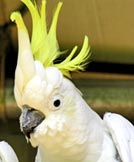
As a parrot owner, you are responsible for keeping your pet parrots in good health. To be able to do this, you must understand that there are certain illnesses that may afflict your parrot. Knowing what these illnesses are and how to detect their symptoms will help you in keeping your pet parrots in the best of health.
When buying a new pet, make sure to observe it carefully to make sure its not sick. Quarantine it for a couple of days before allowing it to join your other pet birds. Buy from a reputable breeder who is known to breed healthy and well-adjusted parrots. Dont expose yourself or your other pets to diseases. Your new parrot can be suffering from any of the following afflictions that are common among parrots:
•Hypocalcaemia — This is a condition wherein the parrot suffers from a grave lack of calcium or an imbalance of calcium and phosphorous which it sorely needs. Having adequate calcium is important for a parrot for the proper contraction of its muscles and the development of its bones. A lack of it, especially among female parrots, results in the latters inability to develop and release eggs. The improper contraction of muscles causes egg-binding or the inability of the female parrot to properly expel an egg leaving it lodged in the birds oviduct. Treatment of this condition includes applying heat to the female parrot, encouraging it to increase its fluid consumption, lubrication of the vent, and direct administration of calcium. Another symptom of this condition is severe nervousness in your pet parrot.
• Psittacosis — This is a condition, also known as zoonosis, common among parrots, which may actually infect the animal years before it exhibits any symptoms of it. A parrot suffering from Psittacosis may display the following clinical respiratory signs: sneezing, coughing, eye discharges, diarrhea or soft droppings, lack of appetite, sudden death or overall sick feeling characterized by the birds being fluffed up and off-colored. Some parrots may appear normal but are actually carriers of the disease that may also affect humans so be very careful. Management of this illness is relatively easy and may require the removal of calcium as a supplement since calcium is known to interfere with the positive effects of medication.
•Zinc Toxicity — Zinc poisoning is very common among pet parrots as it is normally caused by ingestion of toxic zinc that is used to galvanize parts of the parrots metal cage and almost all of its toys as a means to prevent rusting. Diagnosed through a blood sample, treatment of this condition includes diluting the toxic metal in the bloodstream to allow the kidney to pass it out or, in extreme cases, surgery to remove actual bits of the toxic metal from the birds stomach.
•Aspergillosis — This is a fungal disease among parrots partially due to viruses that can easily be picked up by other birds. This disease can be prevented by providing your pet bird with a dry, non-dusty and well-ventilated environment. While it used to be difficult to treat, medication is now easier to come by with the introduction of itraconazle.
•Teflon Toxicity — This condition is commonly caused by the use of Teflon on non-stick cookware which, when subjected to heat, releases toxic fumes that can actually kill parrots. While avian vets are aware of the deadly effects of this element on birds, they are not aware of the extent of its use among common household utilities. As a pet owner, you have to be careful that your new appliance does not contain Teflon that will put your pet parrot in grave danger.
•Psittacine Beak and Feather Disease — This is a hidden disease caused by a virus that is very difficult to detect and diagnose. Symptoms present themselves only when the condition has advanced to a state wherein it is already fatal to the bird. To make sure that your birds are not infected with this illness, subject them to DNA testing specifically for this virus. If found positive, your bird will be isolated and put on probiotics and a good diet to be retested after 6 weeks.
All these conditions serve to emphasize the need to buy your pet parrots from reputable breeders who will make themselves available to you at all times for questions regarding the health of your new baby. Dont risk infecting your other pet birds and yourself. Be vigilant.